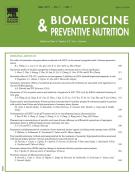d-Pinitol a low-molecular cyclitol prevents 7,12-Dimethylbenz [a] anthracene induced experimental breast cancer through regulating anti-apoptotic protein Bcl-2, mitochondrial and carbohydrate key metabolizing enzymes - 14/03/12

Abstract |
Compounds of dietary origin have always been considered as a paramount entity due to their popular belief of the absence of adverse side effects and also for their extraordinary efficacy against many diseases among which cancer is most important. The present investigation was aimed to evaluate the modulatory effect of d-Pinitol a compound from dietary origin, on the key mitochondrial tricarboxylic acid cycle, carbohydrate metabolizing enzymes and anti-apoptotic protein Bcl-2 against 7, 12-Dimethylbenz [a] anthracene (DMBA) induced mammary carcinoma in female Sprague Dawley rats. Breast caner was induced by intragastric administration of single dose of 20mg/kg body weight of DMBA. The results revealed that the levels of TCA cycle enzymes and carbohydrate metabolizing enzymes were drastically altered in both breast and liver tissues of cancer-bearing animals when compared to controls. Further, the anti-apoptotic protein Bcl-2 was found to be expressed during breast cancer. Interestingly, the oral administration of d-Pinitol at a dosage of 200mg/kg body weight for 45days to breast cancer-bearing rats were found to be significantly brought back the altered enzymes status to near normal range. This therapeutic activity may be due to the antioxidant property of d-Pinitol, which ultimately results in the mitochondrial compartment. Thus, our results clearly confirmed that d-Pinitol has some key modulatory property in mitochondrial and carbohydrate metabolizing enzymes through its antioxidant nature and also regulatory role in the proteins of anti-apoptotic cascade against the free radicals involved oxidative stress-mediated diseases, and which results in the consideration of the compound as safe and more effective in the treatment of mammary carcinoma in the near future.
Le texte complet de cet article est disponible en PDF.Keywords : d-Pinitol, Breast cancer, Bcl-2, DMBA, SDH, ICDH, Hexokinase, Aldolase
Plan
Vol 2 - N° 1
P. 25-30 - janvier 2012 Retour au numéroBienvenue sur EM-consulte, la référence des professionnels de santé.
L’accès au texte intégral de cet article nécessite un abonnement.
Déjà abonné à cette revue ?

